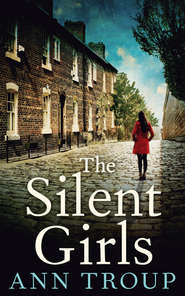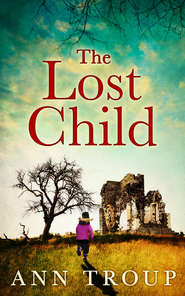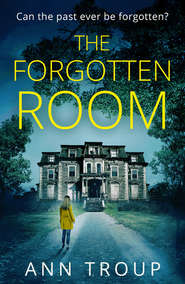По всем вопросам обращайтесь на: info@litportal.ru
(©) 2003-2025.
✖
My Mother, The Liar: A chilling crime thriller to read with the lights on
Автор
Год написания книги
2018
Настройки чтения
Размер шрифта
Высота строк
Поля
Rachel shook her head. ‘There are no relatives, and no friends. Stella is a shy person so she never had friends. Our mother didn’t encourage friends. But I’ve not seen them for a long time – maybe that changed.’
Despite his questions Ratcliffe knew more about the family than he was choosing to let on. Angie had done some homework on them. ‘What about the shop? Didn’t Stella work in the family business? Might she have met people there?’ The Porters had owned a haberdashery, closed for years now, but Stella had worked there.
‘I really don’t know. I think the shop closed when our mother got ill. I haven’t seen them for so long, I don’t know. I’m sorry but I’m really not much help.’
He turned to Charlie. ‘What about you, Mr Jones? You knew her – where do you think she might have gone?’
Charlie shrugged. ‘Don’t ask me. I haven’t set eyes on her for thirty years. Neither did I want to. Sorry, Rach, but you know it’s true.’ Ratcliffe knew it was true too. The last time Charlie Jones had clapped eyes on Stella Baxter was the day she had given evidence against him in court.
He sighed. Why the hell did none of these people know anything? ‘Rachel, do you have a photograph of her?’
Rachel laughed as if surprised by the request. ‘No. We didn’t do photos, unless Frances has one. There are pictures of her wedding, I think.’
Ratcliffe nodded. Typical. ‘OK. Now can you tell us anything about the body that you found yesterday, the child?’
It was the first time that Rachel had shown any real emotion in front of him. Her eyes began to fill with tears as she shook her head. ‘I don’t know, I really don’t. I didn’t even know that there was a cupboard there until yesterday. Oh my God, I can’t believe that someone would do that to a baby!’ she said, her voice trembling.
Ratcliffe noticed Charlie’s body stiffen at Rachel’s words. ‘People are capable of some terrible things,’ he said, looking straight at Charlie.
Charlie looked away.
He asked a few more generic questions and got no further forward. Whatever these two were hiding, he wasn’t going to get it out of them in the casual confines of a hotel room. Sooner or later he’d have to call them both in for a formal interview, put them under a bit more pressure. For now they’d at least given him a few hints as to which direction those formal interviews would take. In Ratcliffe’s mind nothing was ever wasted.
As he drove back to the station he figured that there was no alternative but to get a picture of Stella and give it to the press as soon as possible. Someone would have seen her recently. All they had to do was pick her up when that someone came forward, and they would – they always did. Whatever had gone on in that house over the years, Stella was the one who would know; Ratcliffe was convinced of it.
Strangely, it still bugged him that Charlie had been in Rachel’s room. The air between them had been crackling with tension when he had walked in and whatever their agenda was, it was surely loaded with something more than curiousity.
It hadn’t taken him long to work out that there was more between Charlie Jones and Rachel Porter than met the eye – Charlie’s links to the Porter house went further than his past criminal record. The fact that his mother owned a photograph of a girl who was the spit of Rachel had sparked Ratcliffe’s instincts and he’d been more than a little smug when the team had turned up a marriage certificate and a birth certificate.
Maybe Rachel and Charlie assumed that he already knew that they were married, but neither of them had volunteered it and there had been no mention of their child. Though Jones had balked when Rachel got upset about the dead baby. If Rachel was telling the truth about having left years before and having no contact, she had left her kid too.
She came across as a nice woman – shy, worried, but nice. Could a woman who’d left her own child be called nice? It depended on the circumstances he supposed, but Charlie Jones had been convicted of murder and quite frankly Ratcliffe wouldn’t have left Delia Jones in charge of his dog. To leave a baby with those two would be a determinedly odd thing to choose. Rachel Porter needled him. She wasn’t what she appeared to be and there was far more to that situation than met the eye. And he was going to find out what it was.
***
Back in the incident room, he picked up a message to call Ferris. News was in on the bodies. All he wanted at that point was a decent cuppa and time to think, not a visit to the morgue.
Why couldn’t these forensic people just send a report? He never had understood the necessity of having to be shown the gruesome evidence in all its glory laid out on a slab. What was he supposed to do with the mental images? Chat about them to his wife over dinner? Although it might make an interesting change to Maria Ratcliffe’s usual moaning. Not that he could blame her for getting hacked off. She was a good woman who’d had to put up with a lot from him over the years.
Ferris had completed a basic exam on both victims. Her initial conclusions were that Baxter, whose identity she had confirmed by discovering his wallet still intact inside his rotting clothes, had still been alive when he was placed in the trunk. She showed the detective the feeble scratch marks that scarred the underside of the lid.
‘I don’t think he was alive for long, and I don’t think he had much strength left when he made these marks. There is some considerable damage to the skull; I suspect that he was hit repeatedly with something heavy and hard. He would have died from a combination of those injuries and suffocation. There was a substantial amount of sand in his throat. Now that he is out of the sand, and out of an airtight box, he’s going to deteriorate rapidly so I needed to find out as much as I could as soon as I could. I also found something clutched in his hand.’ She held up a bag containing a small gold earring, shaped like a teardrop. ‘My guess is that it belongs to whoever killed him.’
Ratcliffe took the bag and examined the earring. It wasn’t an uncommon design, nothing special at all. Still, if someone could identify it as belonging to Stella, it might strengthen his thoughts on the case. ‘What about the baby? Anything there?’
Ferris sighed. Hardened as they both were to the nature of their jobs, kids were always a tough call on everyone. ‘I think he was dead before he was put in the box. It looks like he was stillborn. To be honest it’s difficult to tell. From the skeleton, the size of the skull, and the length of the long bones, it looks like he had congenital problems. We did manage to salvage this though.’ She passed him another bag containing several thin strips of material. ‘It was what he was dressed in.’
Through the clear plastic Ratcliffe could see a name embroidered on the fabric. ‘Daniel,’ he said aloud. ‘At least the poor little thing had a name.’
‘Anyway, I still have tests to do, and should be getting more results in soon. I’ll let you know as soon as anything comes in,’ Ferris said, bristling. As if she was far too busy to indulge in such mawkish sentiments.
***
Ratcliffe was relieved to be outside and breathing air that didn’t have the rancid aftertaste of decay. No matter how scrupulously clean Ferris’s staff tried to be in there, the whole place still stank of death as far as he was concerned.
He was puzzled by the assertion that Baxter had been alive when he had been stashed in the trunk. From what they did know about Stella, she was a tiny little thing. Baxter had been six foot tall so how had such a small woman managed to manhandle someone that size into a great big trunk? His only conclusion was that she must have had help, which meant that someone else had known that the body was there. His money was on the mother, the dead and therefore perpetually silent Valerie.
They had to find Stella, which meant he had a very good excuse to pay Frances’s husband, Peter Haines, another visit.
Chapter 6 (#ulink_19146dc8-5552-582a-9302-778f64d2421a)
In Rachel’s room, the atmosphere was thick with negativity. Waves of tension were washing across the room, fixing them both into the moment and forcing an uneasy silence. DS Ratcliffe had only just left, but his questions glowed neon bright in Charlie’s mind as if displayed on an imaginary autocue. ‘How well did you know Stella?’; ‘What kind of person is she?’; ‘Did she ever discuss her relationship with her husband with you?’
Stella’s evidence against him in his trial for Patsy’s murder had ensured his conviction. He had spent ten years in prison because of Stella, the woman who had sworn on the Bible to tell the truth, the whole truth, and nothing but. As if anyone living in The Limes even knew what the truth was.
Yes, she had walked into the hallway that day and had been open-mouthed with horror to see him kneeling next to Patsy’s body. Though she had only seen what she wanted to see – she had assumed that because he held a knife in his hand, he was responsible. Charlie was a lot of things, but he’d never been a killer.
In his mind’s eye, he could see the wounds even now, great, savage rents spewing out torrents of blood. If he closed his eyes, it was still there, red pools of it, blossoming on the tiles like a sea of overblown poppies. Blood and more blood soaking into his clothes, clinging to the knife, puddling around his knees. The acrid, metallic tang of it still haunting his nose.
Only one person had witnessed the truth of what happened that day. A ten-year-old kid who had epilepsy. A child who couldn’t be believed. A child who, according to her mother, was a fantasist and a drama queen. The child of a woman who had despised Charlie for years.
Valerie had described Rachel as a problem child to the police, a problem child with an inappropriate crush on an older man. Valerie had blamed herself of course, telling them that it was her fault that Rachel followed Charlie around like a lap dog. As a witness, she had told the jury she hadn’t realised it was a problem until Rachel was prepared to bend the truth for him and cover up his crime. To think that it had gone so far that her child was prepared to lie for him!
Valerie had turned out an Oscar-winning performance as she’d told the twelve good citizens that she saw Rachel’s weaknesses as an indictment of her own poor parenting. She had testified that Charlie was a devious and charming man, and she had no doubt he had coerced Rachel into falsely defending him.
All Rachel had told them was that Charlie had pulled the knife out, not stuck it in, and that he had found Patsy there, in the hall, after she had been stabbed. The police had said that she would, wouldn’t she? The child was terrified of Charlie Jones, so of course she would lie. The jury had shaken their heads at the picture Valerie had painted for them and had looked at her with a mixture of pity and disdain.
Perhaps, that was where it all really began for Charlie. That single moment when he’d realised that the only person in the world who truly trusted him had been Rachel, a geeky ten-year-old kid.
***
Now the adult Rachel watched Charlie warily; that muscle in his jaw was tensing. A bad sign that meant he was in a place where no one else was invited. It was difficult for Rachel to remember a time when she hadn’t felt some form of love for him. An image of Charlie’s smile was one of her oldest memories. Charlie had never brushed her off, never told her to go away, never told her to be quiet and stop pestering. Back then he been like a big brother, fourteen years her senior and awe-inspiringly estimable in her eyes.
When Delia was working in the house Charlie could often be found in the garden, hacking at the undergrowth in a vain attempt to abate its creeping bid for dominance. Then in later years, when he had begun working for Roy and had started to bring the lascivious Patsy with him to The Limes, he had always, without fail, spared time to say something nice to Rachel. What a pitiful little kid she must have been, so grateful for such meagre crumbs and hero-worshipping the cleaner’s boy because he had been kind.
Frances had been the one with the real crush, but Charlie either hadn’t seen the looks she gave him, or hadn’t noticed the efforts she made. Frances had even tried to emulate Patsy, by plastering on make-up and cutting off her skirts, until Valerie had slapped her face and called her a slut. She had backed off then, and had treated Charlie with condescending contempt ever since. His conviction for the murder Rachel knew he hadn’t committed had made Valerie’s day.
Rachel had been the first one into the hall the day Patsy died. She had raced away from Stella, running up the drive and into the house, panting for breath, cheeks rosy from the chill winter air. The hall had been strangely silent, as if time was holding its breath as she had hung her scarf and coat on the hallstand. Only when she had turned towards the kitchen had her mouth sagged open and her feet turned to lead. Patsy had been lying on the floor in a crumpled, bloody heap. A blood-streaked bubble of spit popping on her lipstick-slicked mouth as the life ebbed out of her.
Rachel had been transfixed, rooted to the spot. When Charlie had strolled into the hall from the kitchen, immediately issuing a guttural, almost primeval cry at the sight of his broken wife, he had thrown himself down onto the floor, instinctively pulling the knife from her chest, staring in horror as a pool of blood crept silently, still warm, towards his knees.
Though she could picture it vividly, Rachel couldn’t remember how many minutes the old grandfather clock had marked before Stella walked through the door and something other than death had begun to happen. It had felt like an aeon.
Charlie maintained that he had walked into the back of the house having come from the park, using the small gate that gave the residents of The Limes private access. However, there were no witnesses. The prosecution postulated that Charlie could have been in the house for any amount of time. No one else was in, so no one could corroborate his story. No one except Rachel, but her evidence was inadmissible and at best purely circumstantial. Ten-year-old children were not reliable witnesses.
Rachel knew Charlie hadn’t stabbed Patsy. She had heard that cry. It echoed in her memory like the sound of nails being dragged slowly down a blackboard – a screeching, penetrating sound that made every fibre of her being sing with pain. Most of all it was the memory of the hollow devastation in his eyes that assured her of his innocence both then and now.
If she told him now, told him the true reason she had walked away from him and Amy, she would see that look again. Not just the shadow of it reflected back at her when she looked into his eyes, but a full-blown re-creation of the moment his world had fallen apart for the first time.








